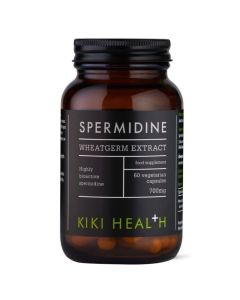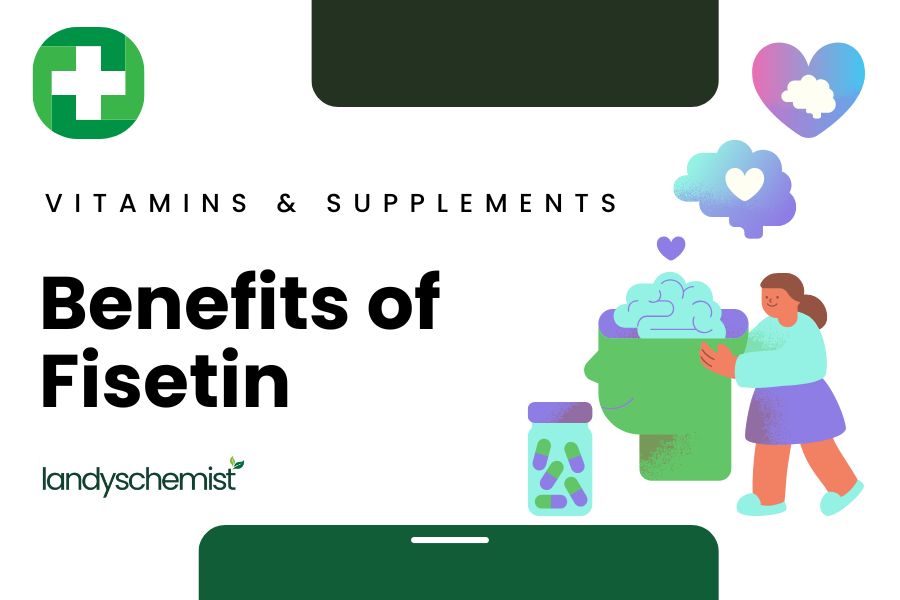
Spermidine Benefits in Health and Longevity
06/10/2024 - By Rhysa Phommachanh (BA) hons Specialist Hair and Media Make-up, Health Expert at Landys Chemist
Spermidine has received growing attention in recent years for its potential benefits in promoting health and longevity by “slowing down ageing”. As research into spermidine's health benefits has expanded, so has interest in ensuring adequate intake through diet or supplementation.
In this blog we go into the scientific research that highlights its potential age-reversing effects, and explore how incorporating spermidine into your diet could potentially support a healthier life.
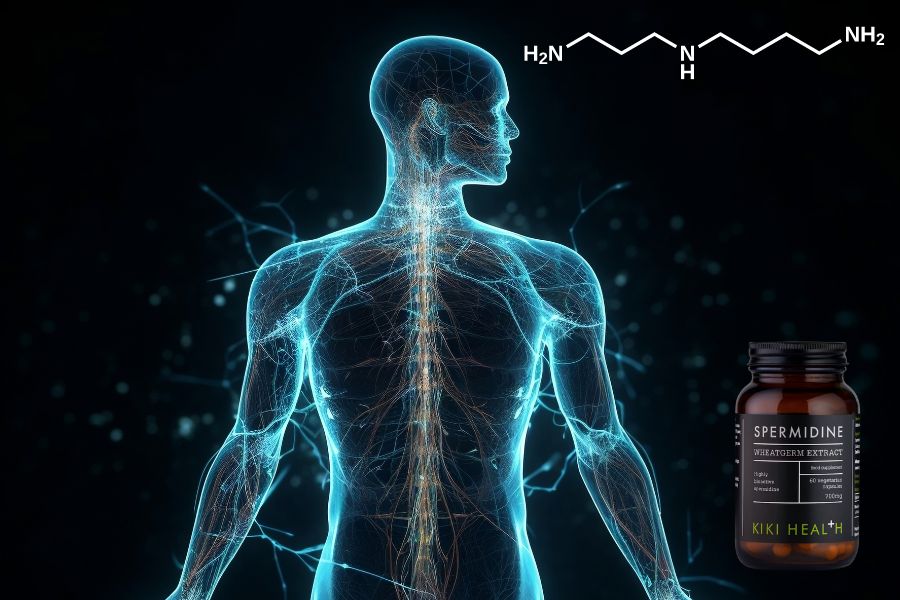
What is Spermidine?
Spermidine is a naturally occurring polyamine compound which plays a role in cell growth and function. These polyamine compounds are found in all eukaryotic cells, these are the cells in our body that contain a nucleus controlling the cell's genetic material (DNA).
The name "spermidine" originates from its discovery in semen, but it is present in various tissues and organisms, including plants and animals.
Where Does Spermidine Come From?
The body naturally creates spermidine and can also be obtained through dietary sources, mainly plant-based sources. It is found abundantly in various foods and can be taken as a dietary supplement which use plant-based sources.
Natural Food Sources Containing Spermidine
- Soybeans
- Aged Cheese: particularly blue cheese and brie.
- Mushrooms: including portobello and shiitake mushrooms
- Cruciferous vegetables
- Whole Grains: wheat germ and bran, one of the highest natural sources of spermidine
- Legumes: such as black beans and chickpeas
- Nuts and Seeds: particularly sunflower seeds
Why take Spermidine Supplements if our bodies create it?
Even though the body naturally produces spermidine, people may look for additional sources for several reasons:
- Ageing and Decreased Production: As we age, the body's ability to produce spermidine decreases.
- Health Benefits: Research suggests that higher levels of spermidine may have age-reversing benefits, such as improving cellular health and promoting autophagy (the process of cleaning out damaged cells).
- Dietary Factors: Not everyone gets enough spermidine from their diet. Foods rich in spermidine might not be commonly consumed by everyone.
- Lifestyle and Environmental Factors: Factors such as stress and environmental toxins may deplete the body's spermidine levels.
Can Spermidine Help You Live Longer?
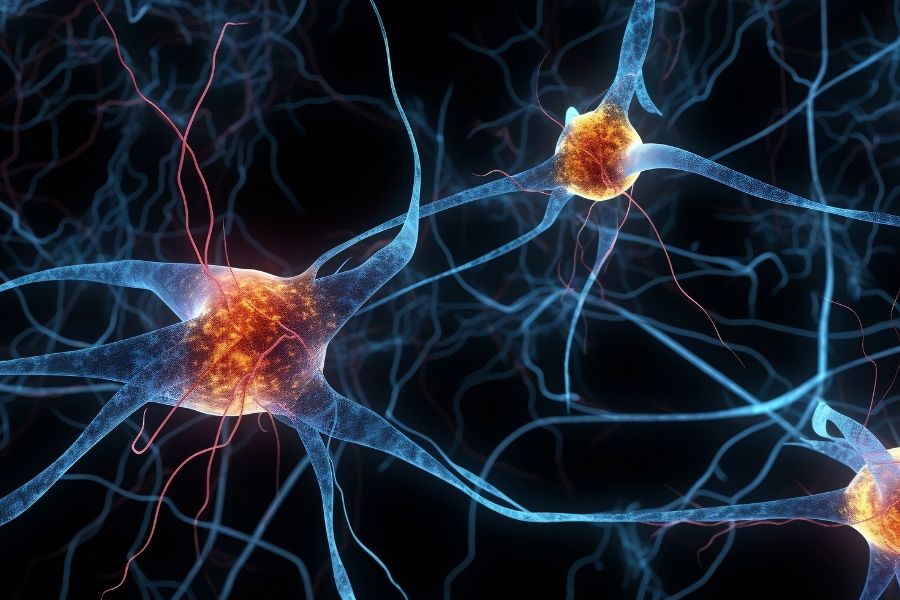
There is no scientifically proven compound that can fully reverse ageing, however spermidine has shown promise in delaying the ageing process. Research indicates that spermidine can induce autophagy and promote cellular renewal. Spermidine supports several crucial bodily functions that contribute to a healthier life, including promoting cell regeneration and repair, enhancing the body's ability to clear out damaged cells, and exhibiting anti-inflammatory properties. Additionally, spermidine may protect against cognitive decline, support heart health by reducing oxidative stress, and help regulate metabolism, supporting healthy weight management.
These combined effects contribute to its potential in promoting longevity and delaying the signs of ageing. A study found that spermidine supplementation was associated with lower mortality rates.
Health Benefits of Spermidine
Promotes Longevity
Spermidine has been shown to activate autophagy, a cellular process that removes damaged cells. Studies have linked autophagy activity to extended lifespan through various functions, and reduce the risk of age-related diseases such as cardiovascular disease (CVD’s), supporting the suggestion that spermidine can help promote longevity. Studies have also shown that spermidine can boost immunity and reduce oxidative stress, further reducing inflammation and cell damage.
Supports Cognitive Function
Research indicates that spermidine may protect against cognitive decline associated with ageing, potentially preventing neurodegenerative conditions like Alzheimer's disease.
Supports Heart Health
Studies have shown that regular intake of spermidine-rich foods is associated with a lower risk of heart disease markers including blood pressure, cardiac hypertrophy, and delaying the progression to heart failure.
Reduces Inflammation
Chronic inflammation is a key driver of many diseases, including cancer, diabetes, and arthritis. Spermidine exhibits anti-inflammatory properties, which research has found may help to reduce inflammatory disease.
Improves Metabolism
Limited research links spermidine to regulating metabolic processes, including lipid metabolism and insulin sensitivity. It is thought that by improving the efficiency of these processes, spermidine can help maintain a healthy weight and reduce the risk of metabolic disorders such as obesity and type 2 diabetes. However, much more research is needed to clarify an association between spermidine and weight management.
Minimises Skin Ageing
Research has looked into the role of autophagy (which is promoted by spermidine) and how this influences skin ageing. Findings conclude that studying autophagy in various skin cells could reveal new ways to preserve skin health in older individuals.
Spermidine may help to improve skin barrier structure and function, and improve the skin microbiome, which can influence skin ageing.
Promotes Hair Growth
Emerging research indicates that spermidine stimulates human hair growth. It is believed that spermidine extends the anagen phase of the hair growth cycle, which is the active growth phase, resulting in thicker and healthier hair. While more studies are needed, initial findings are promising for those struggling with hair thinning and loss.
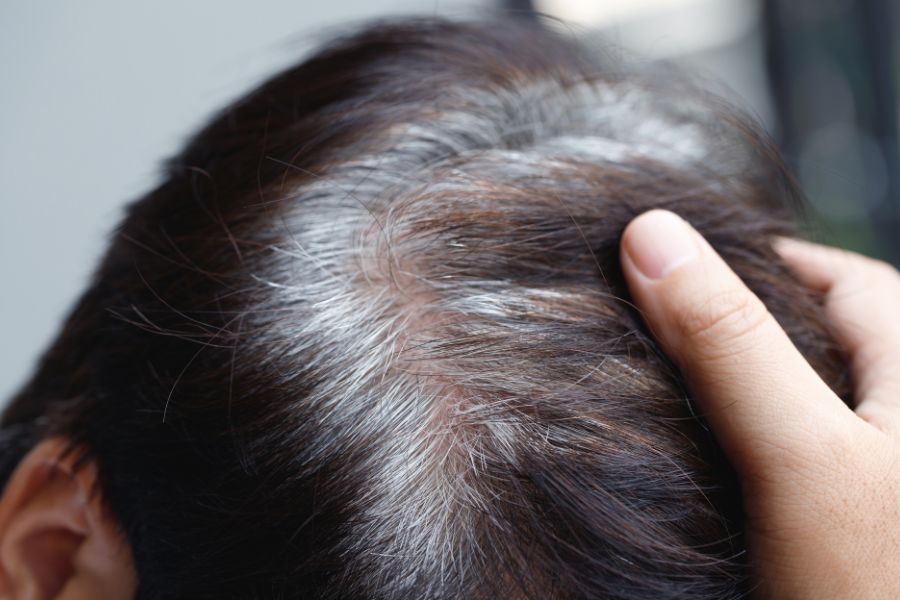
How Much Spermidine Should You Take Per Day?
The optimal dosage of spermidine is still under research, but studies consider that a daily intake of around 1-2 mg is safe and effective. This can typically be achieved through a balanced diet rich in spermidine-containing foods or through supplements.
Side Effects: Downsides to Spermidine
Spermidine is generally considered safe when consumed in amounts typical of a balanced diet. However, high doses from supplements may cause gastrointestinal discomfort or allergic reactions in some individuals.
Avoid Spermidine supplementation if:
While spermidine offers potential health benefits, it may not be suitable for everyone.
- Pregnant or breastfeeding women should avoid it due to unestablished safety.
- Individuals with allergies to spermidine-rich foods like wheat germ or soybeans should avoid these supplements.
- Those with certain health conditions, such as cancer, kidney, or liver disorders, should consult their doctor before use. Spermidine might interact negatively with medications like immunosuppressants, chemotherapy, and blood pressure drugs.
- Avoid taking spermidine with immunosuppressive or antihypertensive medications
FAQ’s
Is spermidine hard on the liver?
No, spermidine is not typically hard on the liver when consumed in dietary amounts between 1-2mg daily. In fact, it has been shown to have protective effects on liver health by promoting autophagy, which helps in the detoxification process and the regeneration of liver cells. However, excessive intake from supplements could potentially cause adverse effects, so it is important to stick to recommended dosages.
Does spermidine reverse grey hair?
There is no strong evidence that spermidine can reverse grey hair. While some studies suggest that it may have a positive effect on hair health and growth, the mechanism behind greying hair involves complex genetic and environmental factors that spermidine alone cannot reverse. Its benefits are more aligned with overall hair health and reducing hair loss.
Does spermidine increase estrogen?
No, spermidine does not significantly affect estrogen levels. Current research indicates that spermidine's effects are primarily related to cellular health and autophagy. There is no substantial evidence to suggest that it has any notable impact on hormone levels.
Does spermidine grow hair?
Yes, spermidine may support hair growth and reduce hair loss, although more research is needed to confirm these effects conclusively. While not a miracle cure for hair loss, it shows promise in maintaining hair health and reducing hair thinning.
References:
- https://www.ncbi.nlm.nih.gov/pmc/articles/PMC6128428/
- https://www.sciencedirect.com/science/article/abs/pii/S0981942810000331
- https://www.aginganddisease.org/EN/10.14336/AD.2021.0603
- https://www.ncbi.nlm.nih.gov/pmc/articles/PMC6999633/
- https://www.sciencedirect.com/science/article/pii/S003257912300398X
- https://www.sciencedirect.com/science/article/abs/pii/S0143417920301013
- https://pubmed.ncbi.nlm.nih.gov/29955838/
- https://www.ncbi.nlm.nih.gov/pmc/articles/PMC5792715/
- https://pubmed.ncbi.nlm.nih.gov/37723019/
- https://www.ncbi.nlm.nih.gov/pmc/articles/PMC9136623/
- https://www.frontiersin.org/articles/10.3389/fcell.2022.819571/
- https://www.nature.com/articles/nm.4222
- https://www.ncbi.nlm.nih.gov/pmc/articles/PMC5805548/
- https://pubmed.ncbi.nlm.nih.gov/33122005/
- https://www.frontiersin.org/articles/10.3389/fnut.2024.1393552
- https://www.sciencedirect.com/science/article/abs/pii/S1871403X21000958
- https://www.ncbi.nlm.nih.gov/pmc/articles/PMC6682604/
- https://pubmed.ncbi.nlm.nih.gov/33608630/
- https://www.nature.com/articles/s42003-020-01619-4
- https://www.ncbi.nlm.nih.gov/pmc/articles/PMC9320090/
- https://www.ncbi.nlm.nih.gov/pmc/articles/PMC3144892/
- https://www.scirp.org/journal/paperinformation?paperid=90920
Keywords: Spearmidine, Spearmine, Putrescine, Autophagy,

